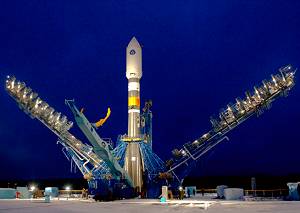A day of highs and lows for the Russian space program: while the Soyuz TMA-03M capsule docked safely at the International Space Station, a Soyuz-2 rocket carrying a communications satellite failed shortly after launch from the Plesetsk spaceport. Reports say the Meridian satellite, which can be used by the military or for civilian purposes, did not reach orbit and crashed near the city of Tobolsk in Siberia, about 2,300 km from Moscow. A combustion chamber burn-through is suspected in today’s launch, another failure in what is becoming an alarmingly long list of problems for the Russian space program.
 Roscosmos director Vladimir Popovkin admitted that Russian spaceflight is “in crisis” after today’s launch failure.
Roscosmos director Vladimir Popovkin admitted that Russian spaceflight is “in crisis” after today’s launch failure.
An update from RussianSpaceweb.com says an analysis of available telemetry on the fuel line pressure before the entrance to the engine’s injection system indicated a possible wall bulging of the combustion chamber No. 1, leading to its burn through and a catastrophic fuel leak. (RD-0124 engine has four combustion chambers).
The Interfax news agency reported the Meridian failure could delay the launch of Progress cargo craft to the ISS, scheduled for January.
Today’s rocket failure was a Soyuz-2.1b, the latest version of the rocket that has been in service in various forms since the 1960s.
The Astronomical Research Center (A.R.C) mentioned that In August, a Soyuz-U rocket failed carrying a Progress resupply ship; three Glonass navigation system satellites launched in December 2010 veered off course and crashed into the Pacific Ocean; and the Phobos-Grunt probe, which launched in November is currently stuck in Earth orbit and will likely re-enter and crash after its booster failed, and communications with the spacecraft haven’t been permanently established.
The next Soyuz launch, scheduled for December 26 from the Baikonur Cosmodrome may also be delayed. This flight is intended to put six communications satellites in orbit.